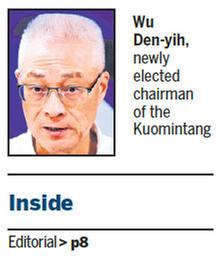Xi congratulates new KMT leader

He expresses hope Wu will work for good cross-Straits ties
Xi Jinping, general secretary of the Communist Party of China Central Committee, congratulated Wu Den-yih on his election as new chairman of Kuomintang on Saturday.
In his message to Wu, Xi said he hoped the two parties will keep the well-being of compatriots on both sides of the Taiwan Straits in mind, adhere to the 1992 Consensus and firmly oppose "Taiwan independence" .
The Communist Party of China and KMT should stay on the right path for the peaceful development of cross-Straits relations and strive to achieve the great rejuvenation of the Chinese nation, Xi said.
Wu, in his reply to Xi's message, expressed gratitude for Xi's congratulations and said he expected the two parties will continue to consolidate the 1992 Consensus and promote the institutionalization of peace across the Taiwan Straits.
Wu expressed the hope that the two parties will carry forward Chinese culture, advance the sustainable development of both sides and join each other on the road to a bright future.
Xi's message conveys the mainland's hope that both parties uphold the political foundation of the 1992 Consensus and oppose "Taiwan independence", and continue to guide the development of cross-Straits relations, Zhou Zhihuai, a researcher at Shanghai Institutes for International Studies, told China News Service.
The CPC and KMT formed cooperation under the common political foundation of the 1992 Consensus between 2008 and 2016, which plays an important part in promoting the peaceful development of cross-Straits relations. Under the current situation, it is important for both parties to stick to the common political foundation, involving how the parties cooperate in the future for the well-being for compatriots across the Straits, he said.

Both parties should make joint efforts to promote the institutionalization of peace across the Straits, Zhou said and expressed the hope that Wu will study the possibility of peaceful agreement across the Straits in the next four years and discuss how to promote the institutionalization of cross-Straits peace "bit by bit", all of which has positive meaning for the well-being for compatriots across the Straits.
An Fengshan, spokesman for the Taiwan Affairs Office of the State Council, hoped that under Wu's leadership, the KMT will continue to adhere to the 1992 Consensus and firmly oppose "Taiwan independence" .
He also hoped that both parties will maintain communication, maintain the right direction for the peaceful development of cross-Straits relations, improve the well-being of the compatriots on both sides of the Straits and strive to achieve the great rejuvenation of the Chinese nation.
"For years, the Communist Party of China and KMT have upheld the political foundation of adhering to the 1992 Consensus and firmly opposing 'Taiwan independence', improving mutual trust, playing an important part to promote cross-Straits relations and peaceful development, and achieve accomplishments," he said.
Wang Hailiang, a researcher of Taiwan studies at the Shanghai Academy of Social Sciences, said, "Basically, Wu Den-yih will follow the (cross-Straits relations) policy of former Taiwan leader Ma Ying-jeou and recognize the 1992 Consensus, which embodies the one-China principle."
"Wu is popular on the island and can improve the KMT's popularity," he said.
"But it is still too early to say his election could affect the cross-Straits relations", he said.
Wu Den-yih was elected with more than 52 percent of all valid votes on Saturday, the KMT announced.
The polls opened at 8 a.m. on Saturday and closed at 4 p.m. Over 58 percent of KMT members who were eligible to vote cast their ballot.
Wu Den-yih got the lion's share of 144,408 votes, or 52.24 percent, to beat the other five candidates - incumbent KMT chairwoman Hung Hsiu-chu (53,063 votes), vice chairman Hau Lung-bin (44,301 votes), former legislator Han Kuo-Yu (16,141 votes), former KMT vice chairman Steve Chan (12,332 votes) and former legislator Pan Wei-kang (2,437 votes).
As per the party charter, a candidate wins the election with more than half the votes; otherwise, the top two candidates contest in a second round.
Xinhua contributed to this story.
(China Daily 05/22/2017 page1)
- A glimpse of Xi's global insights through maxims quoted in 2024
- China's 'Ice City' cracks down on ticket scalping in winter tourism
- Iron stick yams revitalize Wenxian county
- Party chief of Guilin under investigation
- Two radio telescopes put into use to support deep space exploration
- Joint action transforms Mekong region




































